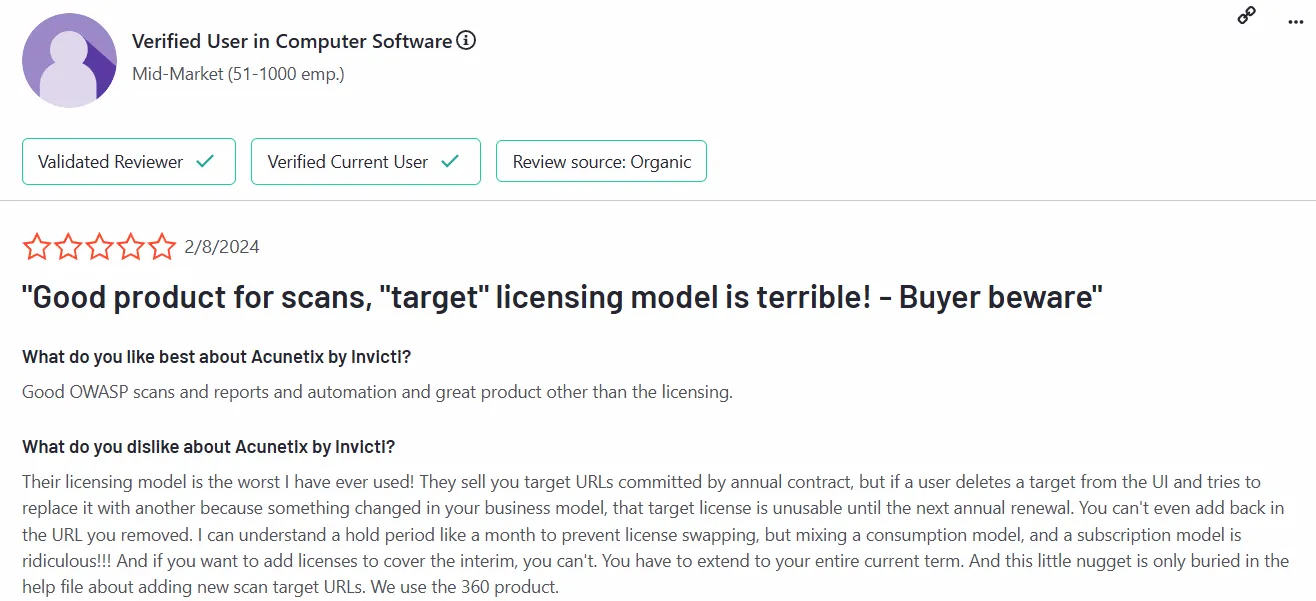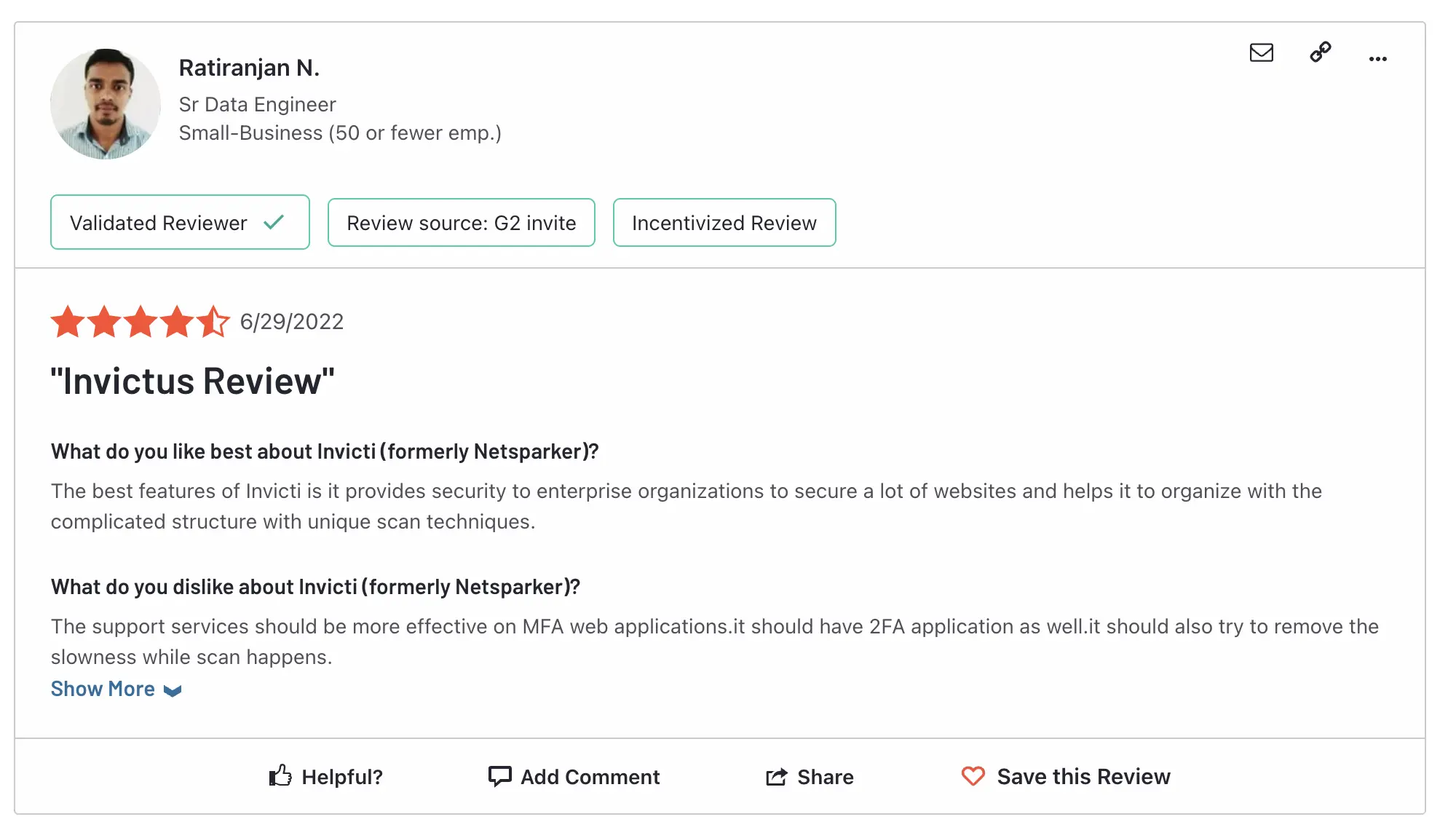![Acunetix vs Invicti (formerly Netsparker): Which is the best choice for you? [2025] Acunetix vs Invicti (formerly Netsparker): Which is the best choice for you? [2025]](/blog/images/acunetix-vs-invicti.webp)
If you’re actively evaluating web application and API security testing platforms, chances are you’ve come across two familiar names: Acunetix and Invicti.
Interestingly, both vulnerability scanning tools are owned by the same parent company: Invicti Security. Acunetix is positioned more toward mid-market companies, while Invicti (formerly Netsparker) targets the enterprise segment with more premium pricing.
At first glance, this split positioning might seem like a sensible product segmentation strategy.
But dig a little deeper, and you’ll realize the differences stop almost as soon as they start.
That’s where this comparison gets interesting. If both are essentially variations of the same core engine, is there real value in choosing one over the other? And more importantly, are either of them the right choice for a security-conscious organization in 2025?
This blog dives deep into the Acunetix vs Invicti debate; I also offer a compelling third contender you may not have fully considered yet: Beagle Security.
A brief history of Acunetix and Invicti
Before diving into the Acunetix vs Invicti comparison, it helps to understand where these tools come from.
Acunetix started in the mid-2000s as a popular web vulnerability scanner. Netsparker (now Invicti) followed soon after with a vision for automation and integration tailored toward enterprises.
In 2018, both brands came under the same umbrella, Invicti Security, creating a shared DNA but with split-market focus.
Their core engine has remained largely similar, but packaging, pricing, and go-to-market narratives differ.
Acunetix vs Invicti at a glance
| Feature | Acunetix | Invicti |
|---|---|---|
| Target market | Mid-market | Enterprise |
| Scanning technology | DAST with some IAST features | DAST with advanced automation |
| Ease of use | Moderate learning curve | Steeper learning curve |
| AI features | Limited | Limited |
| Free trial | None | 7-day trial |
| Pricing | Starts at ~ $7,000/year | Starts at ~ $37,000/year |
| G2 rating | 4.1/5 | 4.6/5 |
| Capterra rating | 4.4/5 | 4.7/5 |
An alternative web & API penetration testing platform: Beagle Security
Beagle Security is a next-generation DAST platform built from the ground up to solve a problem many organizations face: balancing depth of testing, ease of use, and affordability without compromising on enterprise-grade capabilities.
While Acunetix and Invicti come from a legacy mindset, Beagle Security takes a more developer-first and DevSecOps-friendly approach that appeals equally to security and engineering teams.
Beagle Security’s strength lies in its AI-powered automation, its ability to adapt to modern web technologies (including single-page applications and GraphQL APIs), and the flexibility it offers without the complexity often associated with legacy tools.
Why consider Beagle Security in the Acunetix vs Invicti conversation?
No learning curve: Easy for teams of any skill level to get started.
Contextual vulnerability reports: Prioritize what matters, mapped to your app logic, with remediation guidance tailored to your specific tech stack. This ensures you get actionable, relevant fixes instead of generic suggestions.
No lock-in on targets: Flexible pricing and MSSP-friendly model with no artificial limitations. Unlike the per-FQDN pricing used by Acunetix and Invicti, Beagle Security’s enterprise plans are based on concurrent test execution. This gives more flexibility for growing teams and multi-app environments.
Enterprise-grade features without the price tag.
AI-powered security testing:
- AI-based login flow navigation
- Business logic understanding
- Intelligent test case selection
- False positive filtering
- Real-world attack simulations using real penetration testing principles
Acunetix vs Invicti vs Beagle Security: Feature comparison
| Feature | Acunetix | Invicti | Beagle Security |
|---|---|---|---|
| API security | Limited | Yes | Full support |
| AI-based login authentication | No | No | Yes |
| CI/CD integration | Basic | Advanced | Seamless |
| Developer experience | Moderate | Complex | Smooth & intuitive |
| Reporting & exports | Available | Available | Contextual & dev-friendly |
| OWASP mapped reports | Yes | Yes | Yes |
| False positive filtering | Manual effort | Limited | AI-assisted |
| PCI DSS compliance reports | Yes | Yes | Yes |
| HIPAA compliance reports | Yes | Yes | Yes |
Acunetix features
Key Acunetix features
Dynamic Application Security Testing (DAST)
Compliance-focused reporting (PCI DSS, HIPAA, etc.)
Authenticated scan support (cookies, headers)
Limited API scanning (REST, Swagger/Postman)
AcuSensor IAST integration for deeper insight
Basic CI/CD integration
Here’s where things get interesting with Acunetix. Positioned as the “affordable” option in Invicti Security’s portfolio, it promises comprehensive web application security testing for organizations that can’t justify enterprise-level investment.
But scratch beneath the surface, and you’ll find yourself asking: what are you really getting for that mid-market price point?
Acunetix features include the expected suite of vulnerability detection features, but there’s nothing particularly groundbreaking here. The web application scanning covers OWASP Top 10 vulnerabilities. A baseline requirement in 2025, not a differentiator.
Their REST API security testing capabilities exist, but lack the sophistication that modern API-first organizations actually need.
Acunetix offers CI/CD integration with popular tools like Jenkins and Azure DevOps, but the implementation often feels like an afterthought rather than a native capability. The API access is available, but documentation and support for custom integrations lag behind what modern DevSecOps teams expect.
Invicti features
Key Invicti features
DAST engine with high scalability
Enterprise CI/CD and workflow integrations
Team-based access controls
Rich vulnerability tracking and assignment
Limited support for modern API and logic workflows
SSO and role-based access management
Invicti positions itself as the premium choice, commanding enterprise-level pricing with the promise of advanced capabilities. But after years in the market, it’s worth asking: does the price premium translate to proportional value, or are you paying for complexity disguised as sophistication?
The zero false positive technology claim deserves skepticism. While Invicti does reduce false positives compared to basic scanners, the “zero” claim is marketing hyperbole. Any security professional who’s used the platform extensively will tell you false positives still occur, particularly in complex enterprise environments.
The DevSecOps integration capabilities are genuinely comprehensive, supporting complex enterprise workflows. However, implementing these integrations often requires significant time investment and specialized expertise.
Invicti’s large-scale scanning capabilities are real, but they come with infrastructure requirements and complexity that many organizations underestimate. The multi-tenant architecture supports enterprise needs, but also introduces management overhead that smaller security teams struggle to justify.
The workflow automation and policy engine features are powerful in theory, but many organizations find themselves spending more time configuring automation than they save from having it. The learning curve is steep, and the ongoing maintenance requirements are significant.

Source: G2
Beagle Security features
Key Beagle Security features
AI-powered DAST and business logic testing
Contextual remediation guidance based on tech stack
Full API security support (REST, GraphQL)
Real-world penetration testing simulations
Intelligent test case selection and false positive filtering
Seamless CI/CD integration and DevSecOps alignment
Concurrent test-based pricing for enterprise flexibility
Easy onboarding and intuitive UX
While Acunetix and Invicti represent variations on traditional vulnerability scanning approaches, Beagle Security asks a different question entirely: what if we rebuilt web application security testing from the ground up for modern development practices?
Unlike the “AI-powered” claims you see everywhere, Beagle Security’s AI engine actually changes how security testing works. Instead of running predetermined test scripts, the platform analyzes application tech stack and generates contextual test cases.
The automated penetration testing capability doesn’t just scan for known vulnerabilities: it attempts to understand how an attacker might actually exploit your specific application architecture. This behavioral approach catches business logic flaws that traditional scanners miss entirely.
API security testing is where Beagle Security’s fresh approach becomes apparent. It’s designed for organizations where APIs are the primary attack surface, especially with the support of the API discovery feature.
The single-page application support actually works with modern JavaScript frameworks because the platform was built with these architectures in mind, not retrofitted to support them.
Beagle Security’s continuous security testing adapts to your development cycle rather than forcing you to adapt to the tool.
The dynamic test case selection means you’re not locked into predefined vulnerability checks. The platform evolves its testing approach based on what it learns about your applications.
Unlike tools that were originally designed for on-premise deployment and later adapted for cloud use, Beagle Security’s cloud-native architecture provides genuine advantages. The scalable infrastructure means you don’t need to plan capacity or manage underlying resources.
Acunetix vs Invicti vs Beagle Security: Pricing comparison
| Platform | Starting price | Free trial |
|---|---|---|
| Acunetix | ~$7000/year for 5 FQDNs | No |
| Invicti | ~$37,000/year+ for 50 FQDNs | 7-day trial |
| Beagle Security | Self-serve plans start at $1188/year Enterprise plans start at $8500/year for 5 concurrent tests | 14-day free trial |
*Pricing based on data available from AWS Marketplace.
Acunetix pricing
Acunetix’s pricing starts at about $7000 and is targeted towards mid-market companies but can quickly scale up with additional targets. Pricing is primarily based on the number of FQDNs, which can become restrictive and expensive as your application landscape grows.
It lacks a free trial, so there’s no way to evaluate its capabilities before committing.
Without hands-on access, you’d have to commit financially before truly understanding whether the tool fits into their workflows or supports their tech stack effectively.
The total cost of ownership can end up being significantly higher than what may seem at first glance, especially if you’re managing multiple environments or fast-changing applications.
Invicti pricing
Invicti, starting at $37,000, positions itself as an enterprise-grade solution, and its pricing reflects that. While it does offer a 7-day free trial, which is helpful for initial evaluation, the actual pricing is typically based on the number of FQDNs and other factors like organization size, scan volume, and deployment preferences (cloud vs on-prem).
This lack of upfront transparency can make budgeting difficult.
In addition to base pricing, many enterprise features such as team-based access control, advanced CI/CD integrations, or premium support services are often gated behind additional contracts or upgrades.
For MSSPs and distributed security teams, this model can be both restrictive and costly.
Beagle Security pricing
Beagle Security is refreshingly transparent. Pricing is based on features and usage, not arbitrary target limits. It offers annual and monthly plans with MSSP-friendly models. Most importantly, you can try it for free before deciding.
Even at lower tiers, you get access to core features including AI automation, business logic testing, and CI/CD integration, making it one of the most cost-effective platforms for proactive security testing.
Acunetix vs Invicti vs Beagle Security: Customer reviews comparison
G2 ratings
| Criteria | Acunetix | Invicti | Beagle Security |
|---|---|---|---|
| Ease of use | 85% | 92% | 95% |
| Ease of setup | 86% | 91% | 96% |
| Ease of admin | 85% | 92% | 93% |
| Quality of support | 77% | 91% | 97% |
| Overall rating | 4.1/5 (according to 99 reviews) | 4.6/5 (according to 60 reviews) | 4.7/5 (according to 86 reviews) |
*As of latest G2 comparison in June 2025
Capterra ratings
| Criteria | Acunetix | Invicti | Beagle Security |
|---|---|---|---|
| Ease of use | 4.4 | 4.3 | 4.7 |
| Functionality | 4.2 | 4.4 | 4.8 |
| Value for money | 4.0 | 4.2 | 4.8 |
| Customer support | 4.2 | 4.6 | 4.9 |
| Overall rating | 4.4/5 (according to 34 reviews) | 4.7/5 (according to 18 reviews) | 4.9/5 (according to 51 reviews) |
*As of latest Capterra comparison in June 2025
Acunetix reviews
Users highlight Acunetix’s accuracy in detecting common vulnerabilities, effective reporting, and powerful automation engine. Many appreciate its ability to deliver compliance-ready reports and maintain consistent coverage for standard web attack vectors.
Its automation helps teams maintain security baselines with minimal manual effort, especially for common frameworks and technologies.
However, several users have expressed that Acunetix begins to show its limits when applied to more complex applications or modern testing requirements.
The licensing model, for instance, has been noted as rigid, often resulting in escalated costs for teams managing multiple targets.

Authentication workflows, particularly those involving multi-step or token-based logic, can require time-consuming manual configuration.
Customer support experiences appear to be a mixed bag. While some report timely assistance, others mention slow turnaround times or generic responses.
As security teams increasingly work with SPAs, GraphQL APIs, and rapidly changing dev environments, Acunetix’s limitations around modern authentication, intelligent crawling, and nuanced business logic detection have been pointed out.
While it works well for basic security hygiene, power users often outgrow its capabilities quickly.
Invicti reviews
Invicti is praised for its ability to detect vulnerabilities accurately at scale, especially in large and complex enterprise environments. The platform receives consistent recognition for its detailed reporting, advanced automation, and seamless integrations with CI/CD tools.
Users also highlight the responsive customer support and onboarding assistance that smooths the path to production use.
That said, Invicti isn’t without challenges. A number of users have mentioned performance slowdowns during broad scans and lengthy scan times for large applications.
While the tool boasts enterprise features, several users note that tapping into its full capabilities comes with a steep learning curve.
Another common concern raised is the lack of support for 2FA-enabled testing, making it harder to scan applications protected by modern authentication methods out of the box.

Upgrade processes between major versions, as well as configuring complex app environments, are occasionally flagged as difficult.
Some also feel that business logic testing and detection of subtle vulnerabilities fall short, requiring supplementary manual testing.
Beagle Security reviews
Beagle Security is praised for its intuitive UI, developer-first reporting, realistic testing, and affordable pricing. Many customers appreciate the AI capabilities and fast, responsive support team.
Users consistently highlight how easy it is to onboard, configure, and launch tests. Reports are structured for technical clarity and business context, reducing dependency on security experts for interpretation.
Acunetix vs Invicti vs Beagle Security: Which is best for you?
Choose Acunetix if:
You’re a mid-sized company with a small security team.
You want to scan traditional web apps and don’t mind spending time customizing.
You’re okay with a bit of a learning curve.
Choose Invicti if:
You’re an enterprise that values structured automation and budget isn’t a concern.
You already use tools from the Invicti ecosystem.
You can manage manual validation for false positives.
Choose Beagle Security if:
You want enterprise-grade security without enterprise pricing.
You need real-world penetration testing features without managing complex configurations.
You’re tired of target lock-ins and expensive FQDN-based pricing models.
You want to test modern web apps, APIs, GraphQL, and complex login flows easily.
You value AI-assisted penetration testing, clear remediation guidance, and a platform that integrates cleanly into your CI/CD pipeline.
Try Beagle Security for free to see how it compares
Acunetix vs Invicti may feel like choosing between Pepsi and Diet Pepsi.
But if you’re looking for something smarter, leaner, and truly modern, Beagle Security is the clear alternative.
Beagle Security delivers the features you need, without the overhead you don’t.
Experience why more organizations are switching from legacy tools to Beagle Security.
You can start a 10-day free trial or schedule a demo to get started with the Beagle Security platform.


![OpenVAS vs Nessus: Which is the best choice for you? [2025] OpenVAS vs Nessus: Which is the best choice for you? [2025]](/blog/images/openvas-vs-nessus-which-is-the-best-choice-for-you-2025-cover.webp)


![Top enterprise application security tools [2026] Top enterprise application security tools [2026]](/blog/images/blog-banner-four-cover.webp)
![Top vendor application security testing tools [2026] Top vendor application security testing tools [2026]](/blog/images/blog-banner-six-cover.webp)
![Best API security tool for developers [2026] Best API security tool for developers [2026]](/blog/images/blog-banner-five-cover.webp)

![Top Bright Security alternatives [2026] Top Bright Security alternatives [2026]](/blog/images/blog-banner-one-cover.webp)

